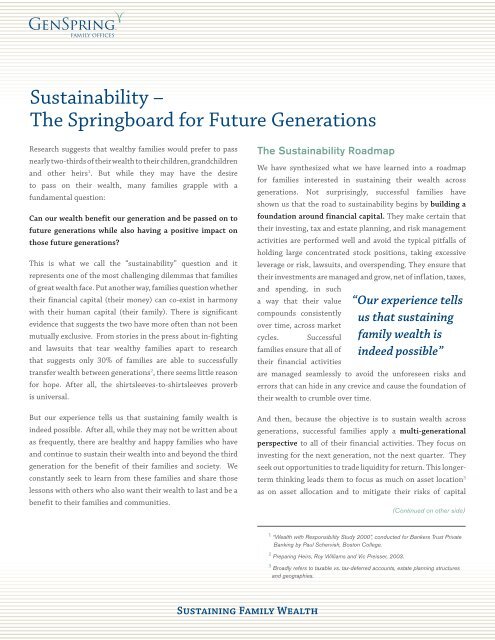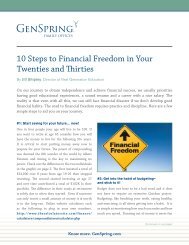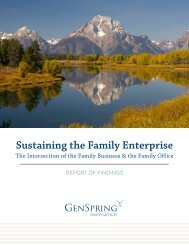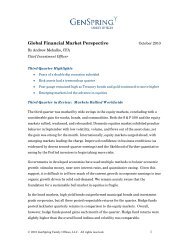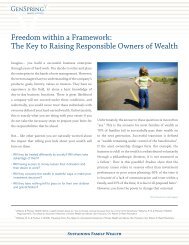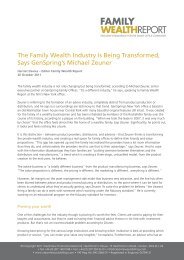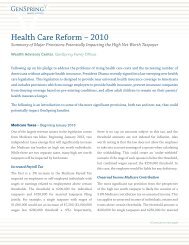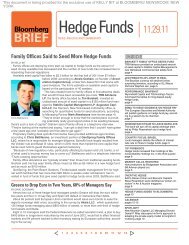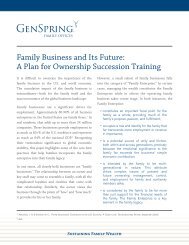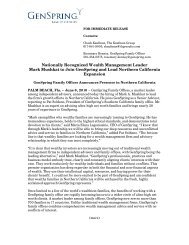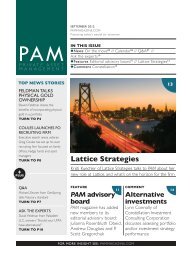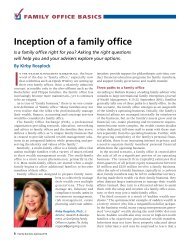Sustainability - The Springboard for Future Generations - GenSpring
Sustainability - The Springboard for Future Generations - GenSpring
Sustainability - The Springboard for Future Generations - GenSpring
You also want an ePaper? Increase the reach of your titles
YUMPU automatically turns print PDFs into web optimized ePapers that Google loves.
<strong>Sustainability</strong> –<br />
<strong>The</strong> <strong>Springboard</strong> <strong>for</strong> <strong>Future</strong> <strong>Generations</strong><br />
Research suggests that wealthy families would prefer to pass<br />
nearly two-thirds of their wealth to their children, grandchildren<br />
and other heirs 1 . But while they may have the desire<br />
to pass on their wealth, many families grapple with a<br />
fundamental question:<br />
Can our wealth benefit our generation and be passed on to<br />
future generations while also having a positive impact on<br />
those future generations?<br />
This is what we call the “sustainability” question and it<br />
represents one of the most challenging dilemmas that families<br />
of great wealth face. Put another way, families question whether<br />
their financial capital (their money) can co-exist in harmony<br />
with their human capital (their family). <strong>The</strong>re is significant<br />
evidence that suggests the two have more often than not been<br />
mutually exclusive. From stories in the press about in-fighting<br />
and lawsuits that tear wealthy families apart to research<br />
that suggests only 30% of families are able to successfully<br />
transfer wealth between generations 2 , there seems little reason<br />
<strong>for</strong> hope. After all, the shirtsleeves-to-shirtsleeves proverb<br />
is universal.<br />
But our experience tells us that sustaining family wealth is<br />
indeed possible. After all, while they may not be written about<br />
as frequently, there are healthy and happy families who have<br />
and continue to sustain their wealth into and beyond the third<br />
generation <strong>for</strong> the benefit of their families and society. We<br />
constantly seek to learn from these families and share those<br />
lessons with others who also want their wealth to last and be a<br />
benefit to their families and communities.<br />
<strong>The</strong> <strong>Sustainability</strong> Roadmap<br />
We have synthesized what we have learned into a roadmap<br />
<strong>for</strong> families interested in sustaining their wealth across<br />
generations. Not surprisingly, successful families have<br />
shown us that the road to sustainability begins by building a<br />
foundation around financial capital. <strong>The</strong>y make certain that<br />
their investing, tax and estate planning, and risk management<br />
activities are per<strong>for</strong>med well and avoid the typical pitfalls of<br />
holding large concentrated stock positions, taking excessive<br />
leverage or risk, lawsuits, and overspending. <strong>The</strong>y ensure that<br />
their investments are managed and grow, net of inflation, taxes,<br />
and spending, in such<br />
a way that their value “Our experience tells<br />
compounds consistently<br />
us that sustaining<br />
over time, across market<br />
cycles. Successful family wealth is<br />
families ensure that all of indeed possible”<br />
their financial activities<br />
are managed seamlessly to avoid the un<strong>for</strong>eseen risks and<br />
errors that can hide in any crevice and cause the foundation of<br />
their wealth to crumble over time.<br />
And then, because the objective is to sustain wealth across<br />
generations, successful families apply a multi-generational<br />
perspective to all of their financial activities. <strong>The</strong>y focus on<br />
investing <strong>for</strong> the next generation, not the next quarter. <strong>The</strong>y<br />
seek out opportunities to trade liquidity <strong>for</strong> return. This longerterm<br />
thinking leads them to focus as much on asset location 3<br />
as on asset allocation and to mitigate their risks of capital<br />
(Continued on other side)<br />
1 “Wealth with Responsibility Study 2000”, conducted <strong>for</strong> Bankers Trust Private<br />
Banking by Paul Schervish, Boston College.<br />
2 Preparing Heirs, Roy Williams and Vic Preisser, 2003.<br />
3 Broadly refers to taxable vs. tax-deferred accounts, estate planning structures<br />
and geographies.<br />
Sustaining Family Wealth
loss. As they do, other critical questions begin to emerge that<br />
highlight the potentially fragile nature of the infrastructure<br />
that surrounds their financial capital:<br />
• Are any of our activities overly reliant on<br />
one person?<br />
• Can I be sure that my advisors are coordinating their<br />
ef<strong>for</strong>ts with one another?<br />
• Will there be continuity in the management of my wealth<br />
if something unexpected happened?<br />
At this point on the road to sustainability, families begin to see<br />
their wealth not only as a series of activities that need to be<br />
per<strong>for</strong>med, but also as an enterprise that needs to be managed.<br />
<strong>The</strong>y build a professional infrastructure of advisors and<br />
providers that is completely aligned with their interests 4 and<br />
can provide continuity across generations <strong>for</strong> the management<br />
of their financial capital.
With their financial capital well taken care of, successful families<br />
then shift their primary focus away from their financial capital<br />
toward preparing their human capital. <strong>The</strong>y orient their<br />
activities toward<br />
realizing higherorder<br />
needs 5 . <strong>The</strong>y<br />
begin to implement<br />
the non-financial<br />
best practices of<br />
multi-generational<br />
families 6 , including<br />
improving family<br />
communication,<br />
building family competencies, and preparing<br />
family members <strong>for</strong> the responsibilities of life<br />
with wealth. <strong>The</strong>se families search <strong>for</strong> answers to<br />
profound questions:<br />
“<strong>Sustainability</strong> starts with<br />
the intentional ef<strong>for</strong>ts of<br />
family leaders who are<br />
not willing to leave the<br />
ultimate fate and impact<br />
of their wealth to chance”<br />
• Is our financial capital really at the service of our<br />
human capital or vice versa?<br />
• How do we prepare future generations to learn about and<br />
inherit wealth?<br />
• What values do we share as a family?<br />
• What is the purpose of our wealth?<br />
This last question can often create an inflection point <strong>for</strong> a<br />
family on the road to sustainability. <strong>The</strong>y and their advisors<br />
have built a solid, multi-generational enterprise around their<br />
financial capital. <strong>The</strong>y have worked hard to prepare their<br />
children, and perhaps their grandchildren, to be responsible<br />
inheritors of wealth. But they know that money must have<br />
meaning beyond its economic value if it is to be sustained. So,<br />
successful families take great care in defining a shared purpose<br />
<strong>for</strong> their wealth that is reflective of each family member’s values<br />
and thoughtfully balances togetherness with individuality.<br />
4 For more in<strong>for</strong>mation, please read our white paper entitled “Advisor Alignment:<br />
<strong>The</strong> Emerging Choice of Wealthy Families”<br />
5 Reference to Abraham Mazlow’s Hierarchy of Needs<br />
.<br />
After capturing their shared purpose in a clearly written<br />
and agreed to family mission statement, successful families<br />
turn their attention to the last element of sustainability –<br />
governing the enterprise. Family governance defines how a<br />
family will work together and make decisions, and can be one<br />
of the most difficult elements of sustainability to put in place.<br />
<strong>The</strong> questions are complex:<br />
• What will we do to achieve our mission?<br />
• How will we make family decisions?<br />
• Who will assume which roles?<br />
• What policies are we willing to live by?<br />
However, when coupled with well-prepared family members<br />
and guided by a clearly written family mission statement, the<br />
answers to these complex questions complete the “springboard”<br />
that propels families <strong>for</strong>ward and allows their wealth to last<br />
and be a benefit <strong>for</strong> generations to come.<br />
<strong>The</strong> Journey to <strong>Sustainability</strong><br />
This is the roadmap that we have seen families follow<br />
successfully in their journeys to sustain family wealth. It begins<br />
with building a foundation around financial capital, managing<br />
it from a multi-generational perspective, and rein<strong>for</strong>cing it<br />
with a professional infrastructure. It then requires a thoughtful<br />
approach to preparing and organizing a family’s human capital<br />
to manage the family enterprise that is their wealth. Because<br />
each milestone takes time to achieve and is accompanied by<br />
increasingly difficult questions, the journey to sustainability<br />
benefits more from the approach of the proverbial tortoise<br />
than the hare. And it does not happen all by itself. <strong>The</strong> journey<br />
towards sustainability starts with the intentional ef<strong>for</strong>ts of<br />
family leaders who are not willing to leave the ultimate fate<br />
and impact of their wealth to chance.<br />
Written by: Maria Elena Lagomasino, Former Chief<br />
Executive Officer (2005-2012); Michael Zeuner, Former<br />
Senior Executive Partner (2005-2012); and Steve Barimo,<br />
Former Chief Marketing Officer (2001-2012)<br />
6 For more in<strong>for</strong>mation, please read our white paper entitled “<strong>The</strong> 25 Best<br />
Practices of Multi-Generational Families”
Sustaining Family Wealth<br />
For more in<strong>for</strong>mation, please call 866.506.1989 or visit us on the web at<br />
www.<strong>GenSpring</strong>.com<br />
©2007 - 2013 <strong>GenSpring</strong> Family Offices, LLC. All Rights Reserved.


